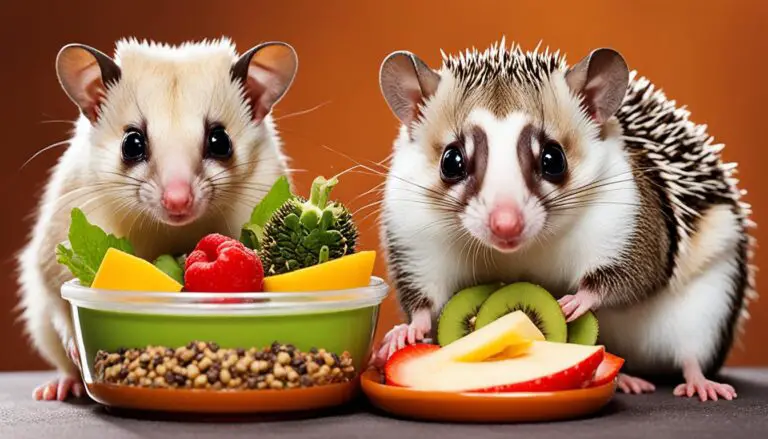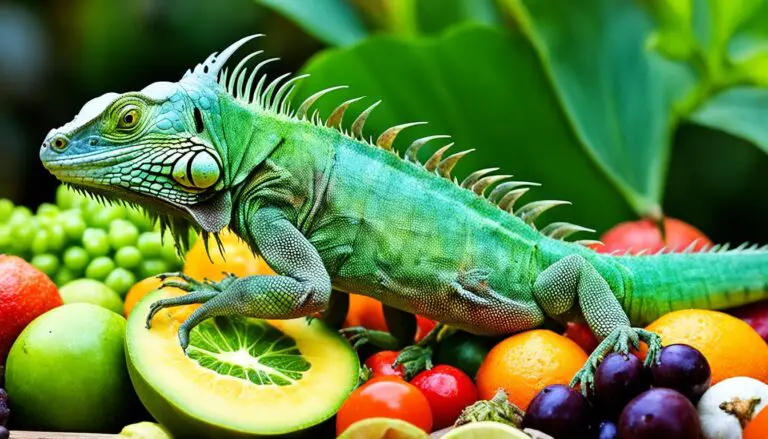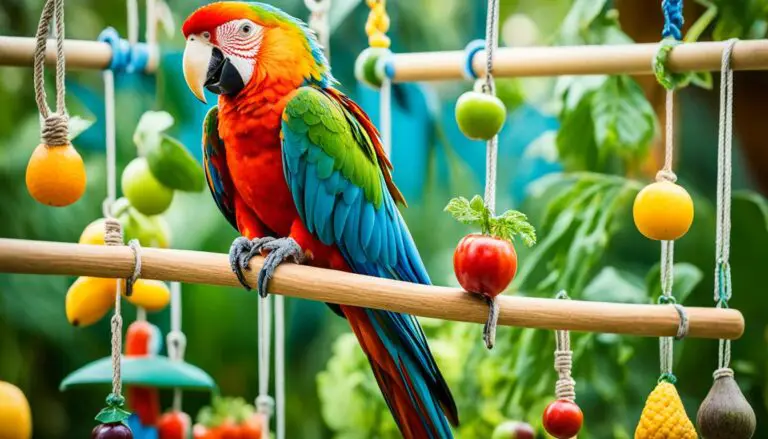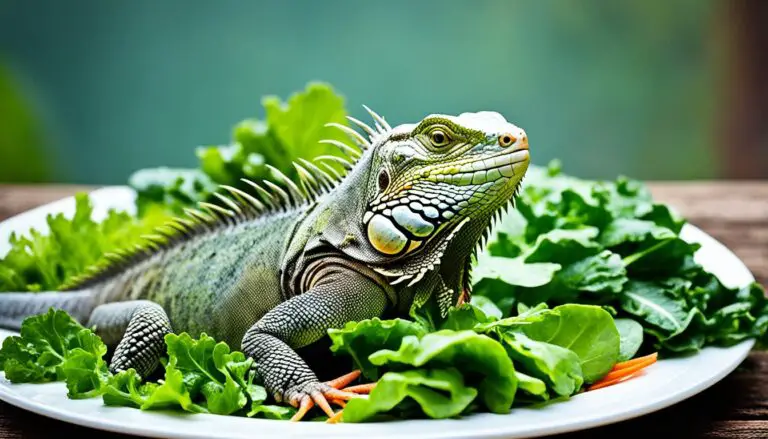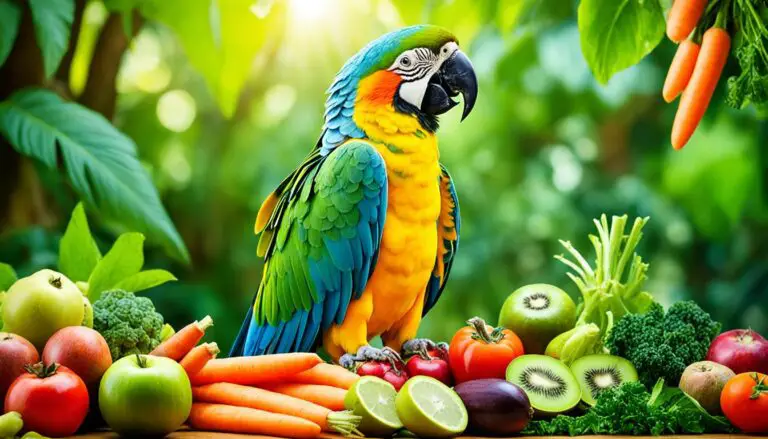Feeding Exotic Pets with Special Needs: Expert Tips
Feeding exotic pets with special needs requires careful attention. Animals like birds, reptiles, and small mammals have diets quite different from ours. Just as we need the right food to be healthy, these pets do too. They need custom nutrition to be their best.
Key Takeaways:
- Feeding exotic pets with special needs requires specialized knowledge and attention.
- Each species of exotic pet has unique dietary requirements.
- Tailored nutrition plans are essential for the health and well-being of exotic pets.
- Consulting with an expert is crucial to ensure you are providing the right diet for your exotic pet.
- Proper nutrition plays a significant role in the overall happiness and longevity of exotic pets.
Getting to Know Your Exotic Pet
Before getting an exotic pet, it’s vital to do your exotic pet research. Each type of pet has special needs. Knowing these will help you take the best care of them.
When doing research, focus on your pet’s natural behavior. Learning about this will help you set up a good environment. It will allow your pet to act in ways that come naturally to them.
Find out about the lifespan of your exotic pet too. This will help you plan for the future and make sure you can care for them over the long haul.
Knowing about potential health risks is also key. It helps you keep your pet healthy. Being prepared can prevent issues and help you quickly handle health concerns.
Before bringing home your exotic pet, it’s key to know their needs, behavior, lifespan, and health risks. This knowledge is essential for their care.
Exotic pets like birds, reptiles, and small mammals all have different needs. Doing solid research ensures you can meet these needs. It helps in offering a happy life for your unique pet.

Housing Your Exotic Pet: More than Just a Cage
Exotic pets need more than a simple box to be happy. They must live in a habitat just like where they come from. This means the right temperature, humidity, light, and even the ground they walk on.
Getting the temperature right is key. Pets like different climates, so it’s vital to know what yours needs. Make sure their home is the perfect warmth or coolness for them.
Humidity is also very important. Many pets need a certain amount of moisture in the air. This keeps them from getting sick and helps them stay healthy.
Exotic pets often need light just like they would in the wild. For instance, some lizards need special light to stay healthy. Setting up the right lights is a must for their health.
The kind of ground they walk on (substrate type) is crucial too. From soft sand to hard soil, they each have their own needs. Choosing the right ground helps them feel at home and act naturally.
Proper housing is more than just the basics. It makes a happy, healthy place for your exotic friend, where they can act like they would in nature.
Looking after your exotic friend’s home takes research and care. By giving them the best living conditions, you help them live their best life.

Examples of Ideal Housing Conditions for Exotic Pets
| Exotic Pet | Ideal Temperature | Ideal Humidity | Ideal Light Exposure | Ideal Substrate Type |
|---|---|---|---|---|
| Bearded Dragon | 90-100°F (32-38°C) | 30-40% | UVB lighting for 10-12 hours/day | Reptile carpet or non-adhesive shelf liner |
| Ball Python | 78-80°F (25-27°C) (warm side) 70-75°F (21-24°C) (cool side) |
50-60% | No direct sunlight, provide a day-night cycle | Cypress mulch or aspen bedding |
| Sugar Glider | 75-80°F (24-27°C) | 40-50% | No direct sunlight, provide a day-night cycle | Paper-based bedding or fleece lining |
Essential Dietary Needs of Exotic Pets
Keeping your exotic pet healthy and happy starts with their diet. Unlike dogs or cats, exotic pets need foods that are just right for them. A diet that matches their natural needs is key to their well-being.
Take iguanas, for example. They love fresh veggies and fruits. Foods like kale, collard greens, and berries keep them fit and full of energy. Freshness and variety are crucial for their health.
Parrots also need a varied diet. They enjoy seeds, fruits, and some insects. Apples, bananas, and seed mixes are excellent for them. This type of diet keeps them balanced and full of important nutrients.
For ferrets, it’s all about meat. They are true carnivores and thrive on animal protein. Chicken and lamb are good choices. But remember, as meat-eaters, they don’t do well with fruits or vegetables.
To keep your exotic pet in top shape, it’s important to know what they should eat. A vet who knows about exotic pets can help make sure they get all the right nutrients. This means they’ll live a long, healthy life.
Here’s a simple guide to what your exotic pet might eat:
| Exotic Pet | Specialized Diet |
|---|---|
| Iguana | Fresh veggies and fruits |
| Parrot | Seeds, fruits, and insects |
| Ferret | Strict carnivore diet |
Offering the right diet makes a huge difference for your exotic friend. With the right foods, they’ll be healthy and happy.

The Value of Regular Vet Check-ups for Exotic Pets
Regular vet check-ups are key for your exotic pets’ health. These animals need preventative care just like common pets. Vets spot health issues early and give the right treatments.
Preventative care is vital for keeping exotic pets well. Vaccines guard them from diseases. Parasite control makes sure they’re clear of harmful pests.
This care is crucial because their health risks may be more than regular pets.
“Regular vet check-ups give a full health check and catch problems early. You can talk about diet, home, or behavior concerns. This is with Dr. Emily Roberts, Exotic Pet Specialist.”
Exotic pets can’t tell us when they’re sick. Vet visits help find hidden health issues early. This can prevent big problems or even save your pet.
Preventative Health Care for Exotic Pets
Vaccines, deworming, and parasite treatments are part of this care. They shield your pet from diseases. The right vaccines boost their immune system against harm.
Parasite treatments keep external pests away. They stop disease spread. Internal parasites get treated, too, with the right meds.
Benefits of Regular Vet Check-ups
Vet check-ups have many pluses for exotic pets:
- Early disease detection: Vets check health and catch problems early.
- Preventative care: This stops diseases and keeps your pet well.
- Diet and nutrition guidance: Vets give dietary tips for each pet’s needs.
- Behavioral advice: Vets help with any behavior changes or concerns.
By making vet visits and health care a priority, you’re ensuring your exotic pet’s health and joy in the long run.

Exotic pets need special care. The Animal Family Veterinary Care Center in Davenport, Iowa, gives top-notch care. Their experts know how to meet unique pet needs.
Safely Handling Your Exotic Pet
When you handle exotic pets, remember they’re not like usual ones. They could get stressed easily and could be hurt. So, it’s vital to be careful and use gentle methods. This helps your pet trust you more.
Handling your exotic pet gently is very important. Be confident but gentle with them because they are very fragile. Don’t make quick moves or be rough. Talking softly to them helps them recognize your voice and relax.
Keep an eye on things, especially with kids and exotic pets. Children might not know how easily these pets can be injured. Be sure kids are always watched closely around your exotic pet to prevent accidents.
To build trust, let your pet get comfortable with you. Encourage this with treats and rewards. Remember, it might take some time for them to get used to you and their new home.
Expert Tip:
When you’re holding your exotic pet, make sure to support them well. And it’s best to get advice from a vet or an exotic pet expert. They can help with the right ways to hold your pet based on its type.
Stick to these tips for careful and kind handling. You’ll soon see a bond of trust with your exotic pet. This makes for a happy, worry-free life for your pet.
| Handling Tips: | Handling Mistakes to Avoid: |
|---|---|
|
|
Mental Stimulation: A Must for Exotic Pets
Just like any other animals, exotic pets need mental stimulation to be happy. It also helps avoid behavioral problems. It’s vital to provide activities that keep their brain active and curious.
To give exotic pets a mental workout, try using toys and puzzles. These items challenge their problem-solving skills. This keeps them sharp and engaged.
Foraging is great for exotic pets. Place their food or treats in various spots in their living area. This mimics hunting in the wild, keeping them entertained and fulfilled.
Exotic pets have different tastes when it comes to mental exercises. Birds love puzzle feeders that make them work for food. Reptiles prefer hiding spots that remind them of their natural habitats.
Adding mental-stimulating activities to their day makes exotic pets happier. This approach also avoids boredom. It’s like bringing a piece of their wild home into yours.
Benefits of Mental Stimulation for Exotic Pets:
- Prevents boredom and related behavioral issues
- Keeps pets mentally sharp
- Promotes natural instincts and behaviors
- Enhances overall well-being and happiness
It’s key to notice what activities your pet enjoys most. By changing their toys and puzzles often, you can extend their interest. This keeps them thrilled and engaged.
“Stimulating a captive animal’s mind is just as important as meeting their physical needs.”
Adding mental activities to your exotic pet’s care is crucial for their health and joy. It’s essential to know what their species needs. This way, you create a living space that supports their instincts.
Maintaining Hygiene for Exotic Pets
Cleanliness is key to keeping exotic pets healthy. Just like any pet, you must keep their living space tidy. This ensures your exotic friend stays happy and well. Remember these tips for proper hygiene:
Frequent Habitat Cleaning
Use regular cleaning to avoid bacteria, mold, and bugs. Always remove dirty bedding fast. Replace it with new, clean stuff. A deep clean should also be part of your routine.
Cleaning Feeding Bowls and Toys
Bowls and toys can collect harmful germs. Clean food bowls well after your pet eats. Wipe toys down regularly with safe cleaning products. Be sure to rinse everything off completely before your pet plays or eats with them.
Regular Cleaning Schedule
Make a habit of keeping your pet’s area, bowls, and toys clean. Doing this on a regular schedule is very important. Consistent cleaning keeps your pet from getting sick. You might want to set reminders or mark a calendar to help you remember.
Good hygiene is vital for your exotic pet’s health and happiness. Keep the living space, bowls, and toys clean to avoid sickness.
Summary Table: Exotic Pet Cleaning Guidelines
| Aspect | Cleaning Procedure |
|---|---|
| Habitat | Regularly remove soiled bedding or substrate. Deep clean periodically. |
| Feeding Bowls | Clean after each meal with pet-safe cleaning products. Thoroughly rinse. |
| Toys | Clean periodically using pet-safe cleaning products. Thoroughly rinse. |
Following these steps will create a healthy home for your exotic pet. This keeps them free from disease and happy.
Conclusion
Exotic pets with special needs need expert care. At the Animal Family Veterinary Care Center in Davenport, Iowa, we focus on their health and happiness. Our team is ready to help your unique pet live a great life.
Give your exotic pet to us and be worry-free. They’ll get top-notch care from specialized diets to regular health checks. We have the skills and know-how to care for your pet’s special requirements.
Contact us at the Animal Family Veterinary Care Center today. Learn about our services or book an appointment. Your exotic pet will get high-quality care. This ensures they enjoy a happy and healthy life.
FAQ
What should I consider before bringing home an exotic pet?
What does proper housing for an exotic pet involve?
What kind of diet do exotic pets need?
Why are regular vet check-ups important for exotic pets?
How should I handle my exotic pet?
How do I provide mental stimulation for my exotic pet?
How do I maintain hygiene for my exotic pet?
Where can I find expert care for my exotic pet?
Source Links
- https://animalfamilyveterinarycare.com/blog/exotic-pet-care-davenport/
- https://www.rspca.org.uk/adviceandwelfare/pets/other
- https://alpineanimal.net/unique-care-for-unique-pets-providing-proper-care-for-exotic-pets/
Peter Stones is the founder of Exotic Pets Place, the leading online resource for exotic pet care information.
With over 10 years of hands-on exotic pet ownership experience, he is deeply passionate about sharing his expertise to help others properly care for their unusual pets.
When he's not writing extensively researched articles or connecting with fellow exotic pet enthusiasts worldwide, you can find Peter at home tending to his own beloved menagerie of exotic animals.


